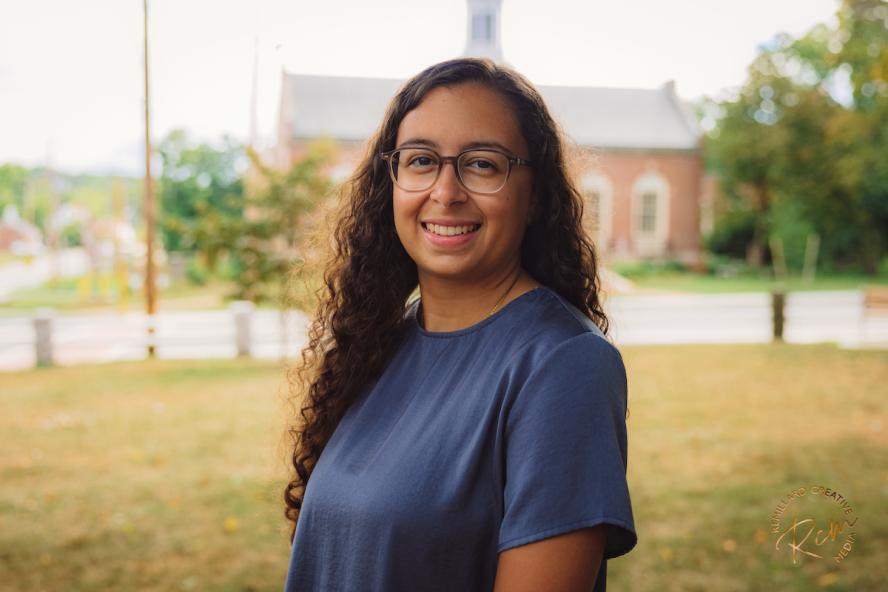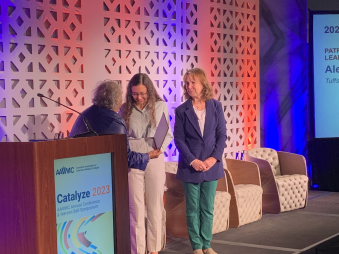-
About
- Leadership & Faculty
- News & Events
-
Admissions
-
Academics
- Graduate
- Advanced Clinical Training
- Continuing Education
- Academic Departments
- Academic Offices
- Simulation Experiences
-
Student Life
- Offices
-
Research
-
- Transformative Research
- Centers & Shared Resources
-
-
Hospitals & Clinics
- Emergency Care
- Hospital Services
-
Community Outreach
- Volunteer
Nationally Recognized for Diversity Leadership
Alexandra Awad, V24, receives prestigious scholarship from American Association of Veterinary Medical Colleges

Alexandra Awad, V24, (she/her) co-founder of the student chapter of the Latinx Veterinary Medical Association (LVMA) at Cummings School of Veterinary Medicine and a catalyst for Spanish language instruction on campus, recently received the prestigious Patricia M. Lowrie Diversity Leadership Scholarship from the American Association of Veterinary Medical Colleges (AAVMC) at its annual conference in Washington, D.C.
The second Cummings School student to earn this scholarship in the last five years, Awad follows in the footsteps of India Napier, V20, the 2019 recipient.
Recognized for “showing exemplary promise as a future leader and for significant contributions to enhancing diversity and inclusion in academic veterinary medicine,” Awad was the lone recipient of this $6,000 award, selected among veterinary students from 54 accredited veterinary medical colleges worldwide.
A 2019 trip to Egypt inspired Awad’s research project, “Attitudes Towards Companion Animals in Egypt,” a country where she hopes to practice medicine in the future. Awad spent time in a small animal general practice during her visit and learned much about the psychology of pet ownership. “Understanding owners and how their culture impacts their human-animal relationship will be crucial to my success as a general practitioner,” she says.
At the AAVMC conference, Awad was also one of 18 second- or third-year veterinary students to receive a Merck Animal Health Diversity Leadership Scholarship, a $5,000 award. Students were honored for their contributions to “enhancing diversity and inclusion through course projects, co-curricular activities, outreach, domestic and community engagement, research, and/or developing an early reputation for influencing others to be inclusive.”
Awad was humbled and honored to receive these amazing scholarships, she says. “I think that having more diverse individuals receive scholarships is so important for other minority or first-generation students to realize that this is a possibility for them, as well.”
Born and raised in Cranston, Rhode Island, Awad is half Puerto Rican and half Egyptian. She got her first pet, a cat named Sonya, at the age of five and soon realized how much she enjoyed animals. On a first-grade field trip to a veterinary clinic, a seed was planted about a possible career. While most young kids often change their minds about what they wanted to be, Alexandra didn’t.
“When I was in third grade I searched ‘how to be a vet’ online and it read that you had to go to vet school. That’s when I found Cummings School and showed it to my parents,” she explains.
Alexandra earned a B.S. in animal sciences from the University of New Hampshire. “With its established pre-vet program, I got a good handle on what being a vet was like and the problem-solving aspect of looking at diseases and figuring out how to translate it to patient care,” she says.
When applying to veterinary schools, she was drawn to Cummings School due to its location [close to family] and its International Veterinary Medicine program. “It was something I was interested in, which other schools didn’t have,” she contends. “I decided that this was the place for me, and I’ve been thriving since then.”
Awad lauds the support and mentorship she has received from individuals across the Grafton campus.
“Dr. Flo Tseng [associate dean for diversity, inclusion, equity, and climate] set me up with a ‘big sibling’ that shared my passion for diversity issues, and has helped me to get involved outside of classes.
“For my research interests, Dr. Felicia Nutter [assistant professor, Department of Infectious Disease and Global Health] served as a mentor for the international aspect and Dr. Emily McCobb [associate clinical professor, Department of Clinical Sciences] consulted with me on the animal perspective/attitude aspect. Dr. Rafael Senos [assistant professor, Department of Comparative Pathobiology] has helped me a lot as the faculty advisor of the LVMA. There are more, but those four have been my key mentors,” she says.
Ale is a remarkable student I have had the privilege to learn and work with,” Senos shares. “She is the kind of leader that does not ask for attention by talking loudly. She operates quietly and guides by example. I know that in 30 years, I will still remember the impact she produced in our community.
Although she admittedly arrived on campus without experience as the primary leader of a group, Awad’s eagerness to get involved naturally progressed to leadership opportunities. “I attended a diversity club meeting shortly after starting here and learned that we were hoping to start a student chapter of the LVMA. I offered to help start it [with Paulina Padrón Saráchaga, V23].”
After developing the club, they identified another area of need. “We established Spanish communication workshops to bring awareness of the importance of knowing another language or where to find resources to translators,” she shares.
The workshops revealed a strong interest among students about offering Spanish courses, which prompted Awad to help establish a Spanish selective course and clinical elective week on campus, both now in their second year. “I’m currently planning the second year of the clinical elective weeks for the fourth-year students just before they graduate. It’s so important to have,” she professes.
Establishing Spanish instruction has also inspired an area of advocacy for Awad. “That led me to my interest in accessibility to veterinary care, which fueled my interest in owning a practice so I can implement ways to reduce barriers, and language is one of them. If I hadn’t done these things with LVMA, I’m not sure I’d know what I’d want to do when I graduate.”
Her involvement also helped Awad to gain and polish her leadership skills. “I realized that if I could lead and innovate these new programs, then I think I can own a business in the future,” she says.
After graduating next year, Awad hopes to work for a non-corporate, small animal general practice where she can learn how to run a business. “If I worked for a corporate practice, they may not be able to provide that kind of mentorship to me,” she shares. “I’m also hoping that I will be supported to become board-certified by the American Board of Veterinary Practitioners in canine and feline practice.”
